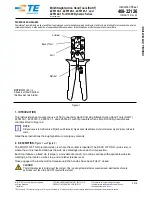
408-32126
Rev
A1
2
of 4
The flip locator positions the contact in the crimping die, and the wire stop aids in locating the wire in the
contact. In use, it rests in the transition area of the connector. See Figure 1 and Figure 3.
The flip locator prevents the contact from bending during the crimping procedure.
The ratchet release lever enables the user to open the partially closed tool handles when necessary.
The ratchet is used to control the crimp height of the
terminal’s wire barrel and ensures full crimping of the
terminal.
Figure 2
3.
CRIMPING PROCEDURE
Refer to the table in Figure 2 and ensure compatibility between the wire, contact, and crimping tool. Wire size
must be within the specified range for the contact. Strip the wire to the length indicated.
CAUTION
Do NOT cut or nick the wire strands.
The hand crimping tool must be the one designed for crimping the wire and contact. Identify the appropriate
crimp section (according to the wire size markings on the BACK of the tool).
Refer to Figure 3 and proceed as follows:
1. Hold tool so BACK (wire side) is facing you.
2. Make sure the ratchet is released by squeezing the tool handles and allowing them to open FULLY.
3. Open flip locator. Insert contact into the flip locator (make sure contact is inserted properly).
4. Close flip locator.
5. Pre-close the handles slightly, and insert the wire into the contact.
6. Close the handles until the automatic ratchet releases.
7. Open flip locator. Take wire with contact out of locator.
Wire Strip Length 1.7 to 2.3
[.067 to .090]
WIRE SIZE
(AWG)
CONTACT
CRIMP
SECTION (WIRE
SIZE MARKING)
HAND TOOL
30
S
1827586-2
1903115-2
30
2255139-1
28
28
28-26
M
1827587-2
1871743-1
1903116-2
1903124-1
1939992-2
28-26
2255140-1
24-22
24-22
28-26
L
1827588-2
1871744-1
1903117-2
28-26
2255141-1
24-22
24-22
22-20
2L
1827589-2
1871745-1
1903118-2
1903126-1
22-20
2255142-1
18
18






















